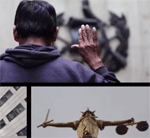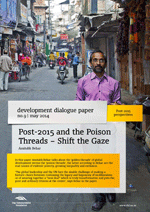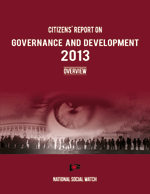Social Watch News
|
Published on Fri, 2014-06-06 00:00
» |
Published on Thu, 2014-06-05 13:19
Only through financial reform can human rights be sustained. The Center of Concern provides this video for your use in classes, meetings, and other community organizing opportunities to educate viewers regarding the need for financial policy makers to be held accountable to those in marginalized situations and poverty. The brief video stimulates new ways of thinking about equality and social justice and its inextricable linkage to financial systems. The program recommends actions that each of us can and should take to address changes in local and global financial systems to promote and sustain equality and human dignity throughout society. |
Published on Thu, 2014-06-05 11:44
In 2000, the United Nations announced eight Millennium Development Goals (MDGs) to reduce poverty worldwide. As the goals “expire” next year, new goals are being defined in UN assemblies and corridors. Some doors in the UN will be shut to public scrutiny but wide open to corporations. “This issue will determine the future of the UN as such,” recently commented a member of the Brazilian delegation to the UN, Guilherme Patriota. |
Published on Thu, 2014-06-05 11:24
As the Millennium Development Goals (MDGs) reach their end date in 2015, there is broad consensus that the development agenda which replaces them has to be universal. Whereas the MDGs applied to developing countries only, the post-2015 development agenda will apply to all countries. To support the implementation and measurement of the post-2015 development goals, a "data revolution" has been called for that will enable governments and policymakers to better track development progress and give citizens the information they need to demand more from their governments and hold them to account. To respond to this, The Centre for Policy Dialogue (CPD), The North-South Institute (NSI) and Southern Voice on Post-MDG International Development Goals (Southern Voice), have launched the "Post-2015 Data Test: Unpacking the Data Revolution at the Country Level", an initiative that examines how the universal post-2015 development agenda can be applied and measured across a variety of country contexts. |
Published on Thu, 2014-06-05 10:57
The premier international conference on public health policy is the World Health Assembly, organised by the World Health Organisation, which attracts Ministers of Health and other top health officials as well as non-governmental organisations to Geneva every year. This is where the latest trends in public health problems are presented and debated, and action plans for solutions are adopted. |
Published on Thu, 2014-06-05 10:24
Post-2015 and the Poison Threads – Shift the Gaze In this paper Amitabh Behar talks about the ‘golden threads’ of global development versus the ‘poison threads‘, the latter according to Behar are the real causes of endemic poverty, growing inequality and exclusion. ‘The global leadership and the UN face the sizable challenge of making a historic choice between continuing the legacy and hegemony of neoliberalism or of weaving together a “new deal” which is truly transformative and puts the poor and ordinary citizens at the center’, says Behar in the paper. The paper is available here. Social Watch India, 2014. |
| Source: . Published on Thu, 2014-06-05 00:00 |
Published on Sat, 2014-05-31 00:00
Book Review By Prof Kuldeep Mathur The Citizens Report on Governance and Development 2013 is the seventh Citizens’ Report of National Social Watch. Democracy is not an easy system of governance. It is fragile and its essence cannot be guaranteed only because there is an assurance of periodic elections. Its fragility is dependent on several factors among whom is the way its governing institutions function and the kind of policies that are determined by them. This requires constant vigilance lest the people who come into power and institutions that they oversee function according to the mandate given to them by the people who have elected them go astray. This vigilance can be exercised only if there is information available to the people. Thus, transparency and availability of information is critical to hold then accountability. |
| Published on Fri, 2014-05-30 23:00 |
|
Published on Fri, 2014-05-30 17:05
» |
SUSCRIBE TO OUR NEWSLETTER









